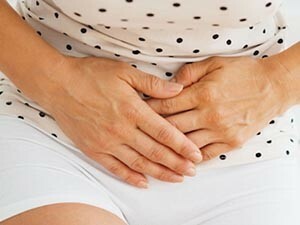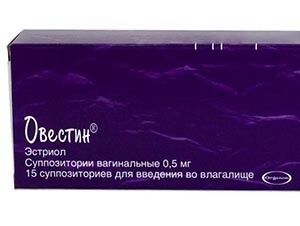Changes in the period of ovarian failure are affecting not only the reproductive organs. They are characterized by a slowing down of metabolic processes, a decrease in immunity, which also affects the urinary system.
Women often develop cystitis with menopause, whose treatment has to be repeated many times. To protect yourself from an ailment, it is worth to understand what it is caused, and how to cope with the infection.
Why is cystitis more likely than before?
 Menopause occurs when the amount of sex hormones decreases. They are of paramount importance for the condition of tissues, including the surfaces of the genital organs and the bladder. Walls of the latter because of the lack of the necessary for tonus and elasticity of estrogen are made thinner, weaker, in them blood supply worsens.
Menopause occurs when the amount of sex hormones decreases. They are of paramount importance for the condition of tissues, including the surfaces of the genital organs and the bladder. Walls of the latter because of the lack of the necessary for tonus and elasticity of estrogen are made thinner, weaker, in them blood supply worsens.
All this - favorable conditions for pathogens, which are the culprits of inflammation of the bladder. They are easily embedded and fixed on its surface.
Climax and cystitis connect the possibility of infection from the reproductive organs. After all, they, because of the decrease in the volume of hormones, become more vulnerable to bacteria. Inflammation of the vagina due to the dryness of its walls, violation of the microflora is easily transferred to the urinary system.

Cystitis during the menopause can appear as if on an equal footing and get a chronic form, if you do not tackle treatment closely.
Signs of inflammation of the bladder in menopause
In principle, the infection manifests itself with the extinction of the reproductive function in the same way as before. There are nuances associated with different stages of development. Depending on them, cystitis with climacteric symptoms shows the following:
- With catarrhal inflammation, there is discomfort in the area of the bladder, periodic noticeable pains and the need to urinate when there is practically no liquid in the organ. The latter occurs very often and with spasms. On examination, it is found that the lower segment of the bladder has turned red, puffiness and small erosive changes have appeared. But urine analysis does not yet show pathology;
- In interstitial inflammation, cystitis in menopause is disturbed by persistent mild pain, intermittent with its acute attacks. The discomfort becomes more noticeable and is present not only in the bladder, but also in the urethra. Possibly incontinence, in which blood and a cloudy sediment may be present, and leukocytes will be found during the analysis. The liquid is capable of changing color daily. The examination will show strong swelling and redness of the organs, significant erosion of the surface with hemorrhages. Sometimes the mucosa grows, taking the form of polyps. The walls of the bladder are thickened, and flakes are visible in its lumen;
- With atrophy of the bladder mucosa that occurs after 5 years from the last critical days, the infection does not bother with pain. They can occur, but weakly and not for long. The main external symptom is incontinence. At inspection the shell of the organ looks pale, it can grow up to the neck of the bladder. The walls are thickened, and the volume is reduced.
How to eliminate inflammation?
Having in mind the causes of cystitis in menopause, treatment is chosen to eliminate the main one - lowering the number of sex hormones. The method of therapy also depends on the stage of the disease:
-
 At the catarrhal level of infection, local use of formulations with estrogens is sufficient. These are gels, creams, suppositories with estradiol, Ovestin, Divigel, Klimara, which are applied to the mucus of the perineum and vagina. They restore its structure and tone, preventing the development of the disease.3-month treatment is enough to eliminate the conditions for the reproduction of pathogenic bacteria, it is repeated periodically as a prophylaxis. For the removal of inflammation at the same time with hormones apply Cystone, Phytolysin, Kanefron;
At the catarrhal level of infection, local use of formulations with estrogens is sufficient. These are gels, creams, suppositories with estradiol, Ovestin, Divigel, Klimara, which are applied to the mucus of the perineum and vagina. They restore its structure and tone, preventing the development of the disease.3-month treatment is enough to eliminate the conditions for the reproduction of pathogenic bacteria, it is repeated periodically as a prophylaxis. For the removal of inflammation at the same time with hormones apply Cystone, Phytolysin, Kanefron; - In the interstitial stage, cystitis in menopause will require enhanced treatment, which will not be limited to external agents with estradiol. Although for completeness and acceleration of the effect they also apply. But the main thing is the intake of tableted hormones in the preparations Klimonorm, Divina, Ovestin, Klimen, Cleiogest, Tibolon. With bacteria, they are fighting ciprofloxacin, Nolicin, Monural, Furadonin. To stop the pain, including with urination appoint No-shpu, Papaverin, Baralgin, Spazgan. From increased nervousness, contributing to the development of infection, help Pustyrnik, Valerian. To restore the circulation of mucous membranes recommend Trental, Kurantil;
- Atrophy of the walls of the bladder makes the organ insensitive to estrogen, therefore hormone therapy is useless. Perhaps anesthesia with spasms, which, incidentally, do not cause much concern, for the elimination of bacteria, the antibiotics already mentioned. With incontinence there is a chance to cope only surgically. All this - the reasons not to bring the disease to the extreme stage, but to fight it with the initial stage. But with the timely use of hormone-containing drugs, atrophy of the walls of the bladder does not threaten a woman.
 We recommend reading an article about the symptoms of menopause. You will learn about the causes of extinction of the reproductive function of the body, the appearance of pain syndromes and dryness of mucous membranes, as well as the need for drug therapy.
We recommend reading an article about the symptoms of menopause. You will learn about the causes of extinction of the reproductive function of the body, the appearance of pain syndromes and dryness of mucous membranes, as well as the need for drug therapy.
How to prevent relapse?
With a disease such as cystitis in menopause, hormonal treatment is not a guarantee that he will not bother anymore.

If a woman does not want the disease to return, it is necessary:
- Carefully monitor the cleanliness by using pH-neutral agents for washings. It is necessary to make sure that bacteria do not have a chance to get on the crotch from the anus;
- Choose clothes from natural fabrics, free enough to exclude the possibility of violation of blood circulation;
- Limit the amount of spices, salty foods, smoked foods in the diet. They irritate the mucous, provoking inflammation;
- Avoid all hypothermia. Frozen legs or hands can crawl with bladder inflammation;
- Drink up to 2 liters per day of fluids. These are additional opportunities to "wash out" the infection and maintain tissue in a tone;
- Avoid constipation. Strong muscle tension during defecation will affect the walls of the bladder.
Cystitis in menopause is not so insignificant as it seems to anyone. And to treat it better at an early stage. So it will be possible to avoid many serious problems and painful manifestations.
